
Registration Information
REGISTRATION OPENING SOON!
Registration pricing for the 2025 Annual Conference is listed below. For questions, email info@aptaoregon.org.
APTA-Oregon Member Pricing
PT Member $225
PTA Member $175
Student Member $99
Non-Member Pricing
PT Non-Member $325
PTA Non-Member $250
Student Non-Member $149
Service Member $195
Speaker Profiles

Dr. Jennifer Brodsky
Dr. Brodsky is a postdoctoral fellow with appointments in the Balance Disorders Lab at Oregon Health and Science University and the VA National Center for Rehabilitative Auditory Research. She completed her PhD in August 2024 at the University of Washington in Seattle, WA. She received her Doctorate in Physical Therapy from Northern Arizona University in 2007 and enjoyed over 12 years of clinical practice before pursuing her PhD. Dr. Brodsky’s research interest is in understanding how vestibular dysfunction is related to balance and cognition in people with neurologic disorders and older adults.
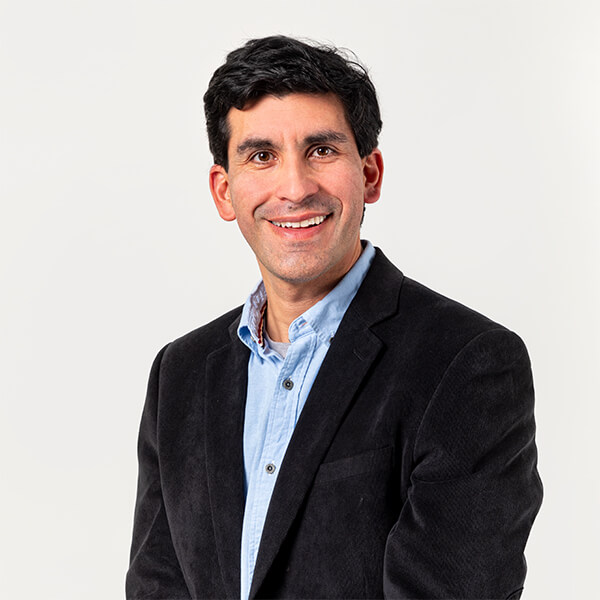
Dr. Pablo Burgos
Dr. Burgos is a dedicated Physical Therapist with over 18 years of experience, specializing in neuroscience and neurorehabilitation. After earning a PT degree in 2006 and a neuroscience qualification in 2009, Dr. Burgos became a professor at the University of Chile in 2011, teaching courses on motor control, neuro PT assessments, and interventions, as well as physiology for the Department of Neuroscience.
Dr. Burgos completed a PhD internship at UCSD's Swartz Center for Computational Neuroscience in 2013, focusing on high-density EEG data analysis, and a postdoctoral fellowship in motor control at the University of Oregon in 2014. Since 2017, Dr. Burgos has led independent research supported by numerous grants, focusing on innovative neurorehabilitation approaches, including balance telerehabilitation, exoskeletons for stroke recovery, AI-driven gait assessments, and early cerebral palsy detection using motion sensors.
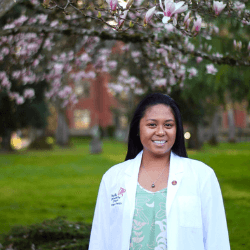
Dr. Alssie Casayuran
Alssie Casayuran (she/her/hers) is a recent graduate from Pacific University DPT program and serves as an active member of APTA-OR’s Cultural and Minority Affairs Committee and the social media chair for APTA Pediatrics Diversity Equity and Inclusion Committee. Her current academic interest includes cultural humility, promoting inclusive care for LGBTQ+ individuals, neurodiversity, disability advocacy, cultural humility, and the use of inclusive language in physical therapy. Clinically, my interests focus on motor development, neurodevelopmental disorders, and pediatric chronic pain.
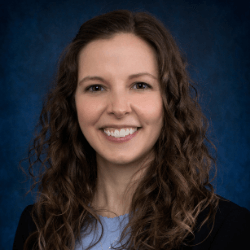
Dr. Kendra M. Cherry-Allen
Dr. Kendra M. Cherry-Allen is an Assistant Professor and Associate Chair in the Doctor of Physical Therapy Education – Oregon Program at Western University of Health Sciences. She specializes in motor recovery after stroke, combining neuroplasticity principles with advanced technologies to improve rehabilitation outcomes. Dr. Cherry-Allen earned her Doctorate in Physical Therapy and PhD in Movement Science from Washington University and completed a Postdoctoral Fellowship at Johns Hopkins University. Her work has been supported by multiple NIH and foundation grants and published in leading journals. Dr. Cherry-Allen is dedicated to advancing neurologic physical therapy education and driving innovations in patient care.
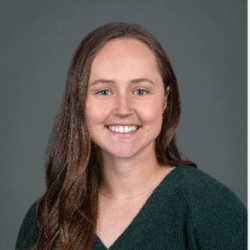
Dr. Julia Combs
Originally from Southwest Washington, Julia Coombs holds a BS in Exercise Science from Regis University and a Doctor of Physical Therapy (DPT) from Creighton University. Introduced to the profession through her experience as a collegiate athlete, she has a strong background in exercise science and worked as a personal trainer while in PT school. Julia is particularly interested in general orthopedics with a focus on geriatrics, sports, and pelvic floor physical therapy.
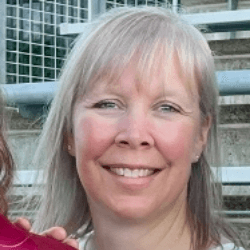
Dr. Rebecca Dobler
Rebecca Dobler is a dedicated healthcare professional with over 25 years of experience in physical therapy, specializing in clinical medicine. She earned her B.S. and DPT from the University of Montana, and Doctor of Education from A. T. Still University (Dec 2024). Becky has a passion for helping parents regain independence and improve their quality of life at all stages of rehab, from ICU to athletic performance. She has a proven track record in interdisciplinary collaboration, parent education, and implementing evidence-based practices. Outside of work, Becky enjoys hiking, running, and photography.

Dr. Amanda Fields
Amanda Fields is a Physical Therapy Orthopedic Resident at the Portland VA, where she is honing her skills in orthopedic rehabilitation. She holds a Doctor of Physical Therapy (DPT) from Pacific University and a BS in Kinesiology from Concordia University Irvine. Outside of her professional pursuits, Amanda enjoys playing the cello, spending time with her dogs, exploring the outdoors, and gardening.

Dr. Lisa Flexner
Dr. Lisa Flexner, PT, DPT, FAAOMPT, is the founder of FlexHealth Consulting, where she helps organizations improve patient health and provider well-being. She was the founding Director of Clinical Education at Oregon State University’s DPT program. She has held academic roles at Oregon State and the University of Washington, and clinical experience at Seattle Children’s Hospital and in private practice, and is a nationally recognized speaker on pain, burnout, and weight stigma. Dr. Flexner earned a B.A. in psychology and M.A. in organizational studies from Stanford University, and a Doctor of Physical Therapy from the University of Washington.
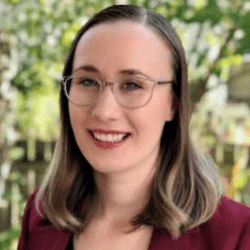
Dr. Tabitha Galindo
Tabitha Galindo, PT, DPT, is a board-certified clinical specialist in neurologic physical therapy and an Assistant Professor in the School of Physical Therapy and Athletic Training at Pacific University. She is in candidacy for a Doctor of Education in Healthcare Education and Leadership. She served APTA as an Oregon Delegate and the primary motion contact for the position RC 7-24 “Adopt: Recommended Education on Trauma-informed Care Across the Physical Therapy Profession” in 2024.

Dr. Max McKinney
Max graduated from the University of Rhode Island’s Physical Therapy program in 2013 and became a Certified Hand Therapist in 2017. He has worked primarily in outpatient therapy, focusing on conservative and postoperative hand and upper extremity rehabilitation. His special interests include performing arts, sports medicine, and working with individuals with connective tissue disorders, arthritis, or chronic pain. Max works as a Regional Director of hand therapy at SportsCare & Armworks Physical and Hand Therapy, serving the greater Portland area. He enjoys instructing occupational and physical therapy students interested in hand therapy, as well as mentoring therapists working toward their Certified Hand Therapist examination.

Dr. Matthew Miller
Matthew is an assistant professor of Kinesiology and assists with Orthopedics, Therapeutic exercise and Professional research in the Physical Therapy school at George Fox University. Matthew has contributed to a Lumbopelvic textbook chapter, has presented on musculoskeletal decision-making in primary care and many community fall risk reduction symposiums. He has years of experience treating patients in a lead role in the primary care setting and is a co-owner of Elevate Physical Therapy. He also works as a clinical instructor to physical therapy students and continues to maintain a patient caseload.

Dr. Li-Zandre Philbrook
Li-Zandre is an assistant professor of physical therapy teaching orthopedics and therapeutic exercise at George Fox University in Newberg, OR. Li-Zandre has published abstracts, papers and book chapters related to Low Back Pain, primary care and adoption of patient reported outcomes and their application to musculoskeletal care. Her published studies include using the Patient Reported Outcome Measurement Information System (PROMIS) measures in routine clinical examination of patients with musculoskeletal problems. She has had the honor of speaking at local and national conferences on optimizing the patient care experience through person centered care. She continues to see patients as co-owner of Elevate Physical Therapy.
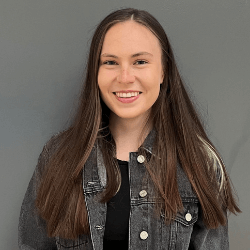
Sammy Pleizia
Sammy Plezia, BA, is a counseling psychology PhD student at the University of Oregon. She previously attended Brown University, where she earned her bachelor’s degree in public health and Hispanic studies and worked as a research assistant at Brown’s Center for Health Promotion and Health Equity. She has since held roles as a research associate at NYU Langone Health and a Fulbright-Nehru research fellow at Sangath’s Addictions and related-Research Group in Goa, India. Broadly, her research aims to develop culturally relevant interventions that reduce weight bias and address eating- and body image-related concerns, particularly in global settings.
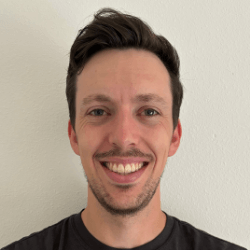
Dr. Zach Shaver
Zach Shaver is the current Sports Resident at Providence in Portland, OR. Zach was born and raised in Las Vegas, NV where he received his bachelor’s degree in Kinesiology (2016) and his Doctorate of Physical Therapy (2019) from the University of Nevada, Las Vegas. He has worked with individuals of all ages and backgrounds, with experience in orthopedics, sports, and pediatric oncology and hematology. Zach has a strong interest in strength and conditioning and promoting physical activity across the lifespan. Outside of work, Zach enjoys spending time with his wife and two kids, rock climbing, and watching sports.

Dr. Emily Spaeth
Dr. Emily Knell Spaeth is a seasoned expert in pregnancy, birth, postpartum, and infant care. As the founder and CEO of Be Well Baby PDX, she combines her expertise in physical therapy, yoga, massage, and lactation support to create a truly holistic approach to peripartum care. Her work in the neonatal ICU highlighted gaps in the support available for birthing families, motivating her to reimagine how care could address both physical and emotional needs of the dyad. Her newly launched High-Risk Pregnancy community: Beyond Birth offers families unparalleled support as they prepare for birth and postpartum.
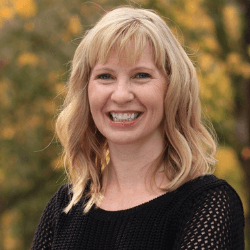
Dr. Catherine Sweeney
Catherine Sweeney, PT, ATP/SMS joined Permobil as Regional Clinical Education Manager in 2019. Prior to this, 24 of her 30-yr career was spent at Providence Portland Medical Center, where she co-founded the outpatient seating clinic program in 2004. As lead seating specialist, Catherine worked to expand access to wheeled mobility services through staff education in OP satellite clinics, home health, and outlying Providence hospitals. She served as the RESNA PT SIG co-chair and is co-founder of the Northwest Assistive Technology Access Coalition with a passion for improving Oregon Medicaid recipients access to assistive technology. She has presented at both the RESNA and International Seating Symposium conferences and remains passionate about furthering best practices when performing wheeled mobility interventions.
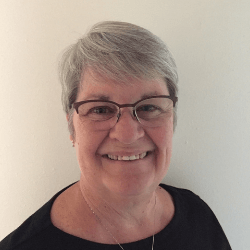
Dr. Jeannie Thompson
Jeannie Thompson, PTA, is retired from Mt Hood Community College PTA program, where she taught for 17 years. Her clinical background is in outpatient orthopedics. She has been a guest lecturer at these Oregon physical therapy programs, Lane Community College, Pacific University, Oregon State University, and Mt Hood Community College. She currently serves as a Delegate for the APTA PTA Council. In this role, she was part of the team that created and presented the APTA position on trauma informed care, RC 7-24 “Adopt: Recommended Education on Trauma-informed Care Across the Physical Therapy Profession” in 2024.

Dr. Tyler Whited
Tyler is an assistant professor of Kinesiology at George Fox University. He teaches multiple courses covering biomechanics, physiology, and physical examination. He assists in the Physical Therapy school at George Fox in Anatomy and Orthopedics. He has published a chapter in an orthopedics textbook. He has worked in outpatient orthopedics as a staff therapist and director, and has worked as a primary care physical therapist. He has given talks to local personal trainers and retirement facilities. He continues to see patients through Elevate Physical Therapy as a co-owner.
CE Session Descriptions
Vestibular Dysfunction in Parkinson Disease
Presented by Jennifer Brodsky
Learning Objectives:
- Describe central and peripheral vestibular dysfunctions potentially related to Parkinson disease.
- Make informed decisions regarding impacts of dopaminergic medications on vestibular function in people with Parkinson disease.
- Apply the current evidence for vestibular dysfunction in Parkinson disease when assessing complaints of imbalance or dizziness in people with Parkinson disease.
- Apply knowledge of potential cerebellar impacts in Parkinson disease to supplement established rehabilitation guidelines for people with Parkinson disease who have vestibular dysfunction.
Description:
There is growing evidence that vestibular dysfunction is present in Parkinson disease (PD), however it is unclear if this dysfunction is disease-specific, age-related, or both. Furthermore, little is known about the effect of dopaminergic medications used to treat PD on vestibular function. This talk will discuss Dr. Brodsky’s research that contributes to the evidence of vestibular dysfunction in PD using comprehensive vestibular assessment, comparisons to healthy similar-aged controls, and examination of the effects of dopaminergic medications. The work explores peripheral and central vestibular function in people with PD using quantitative laboratory measures not typically available in physical therapy clinics but will highlight the application to clinical practice. The talk will include a review of the relevant vestibular anatomy, vestibular testing techniques and their interpretation, and background evidence for vestibular dysfunction in PD. Clinical implications of this study will help the clinician interpret complaints of dizziness and imbalance in people with PD and guide decision making for rehabilitation.
Impairment Oriented Training in Neurorehabilitation, an Application in Stroke
Presented by Pablo Burgos
Learning Objectives:
- Understand the basis of a modular vision of sensorimotor learning
- Analyze the potential modules of the sensorimotor system with an emphasis on the joint degrees of freedom
- Understand the application of modular motor learning in neurorehabilitation
- Discuss some applications in stroke rehabilitation
Description:
This session will show theoretical basis of modular motor learning to then show application in the motor recovery of the upper limb in Stroke in the early subacute phase (first 3 months). It will also explain the modular organization of motor learning, some previous studies about human neuroscience and adaptation and skill learning. Then, will show some translational approaches in neurorehabilitation using this modular approach. And in conclusion will share some preliminary results of our ongoing research in the early subacute phase of stroke, using this modular approach with exoskeletons and exergames to promote the motor recovery of the upper limb.
Beyond the Clinic: How to best support neurodivergent patient clients as clinicians/community practitioners
Presented by Alssie Casayuran, Talina Corvus, PT, DPT, GCS, PhD; Kate Stribing, PT, DPT, PCS; Jose Reyna, PT, DPT, OCS
Learning Objectives:
- Develop and implement treatment strategies tailored to the unique needs, preferences, and goals of neurodivergent individuals. Utilize current resources, such as continuing education courses and guidelines from organizations like the APTA, to stay informed on best practices.
- Advocate for system-wide changes within workplaces and academic institutions, such as sensory-friendly environments, neurodiversity awareness training, and inclusive policies, to ensure sustained and equitable support for neurodivergent individuals.
- Critically analyze and discuss research on societal definitions of success, emphasizing the importance of refraining from imposing personal biases or ableist perspectives. Encourage collaboration with patients to define goals that align with their individual values and aspirations.
- Actively participate in discussions led by interdisciplinary panels to explore challenges and opportunities in supporting neurodiverse populations in clinical settings. Share experiences, learn from peers, and implement insights into daily practice to improve patient outcomes and inclusivity.
Description:
This course explores the integration of neurodiversity principles into physical therapy (PT) practice, focusing on individualized care, institutional support, and challenging societal norms of success. Participants will gain the knowledge and tools necessary to create inclusive and patient-centered treatment strategies for neurodivergent individuals while also addressing broader system-level opportunities for support in workplaces and educational institutions.
Instructional strategies include expert-led lectures, interactive speaker panels, and collaborative small group discussions. Through these methods, participants will examine current research on societal standards of success and learn how to collaborate with patients to set goals aligned with their unique values and aspirations. Case-based learning will provide practical examples, enabling participants to translate theoretical concepts into actionable clinical strategies.
Knowledge translation methods will emphasize the use of clinical resources, such as guidelines from the APTA, sensory integration tools, and universal design principles, to enhance individualized care and institutional practices. Participants will also explore how policies and environmental adaptations can foster neurodivergent-friendly spaces in both clinical and academic settings.
Evaluation will include active participation in discussions, analysis of case studies, and reflective assignments to assess understanding and application of course concepts. By the end of this course, participants will be equipped with the skills and knowledge to support neurodiverse populations effectively, both as individual practitioners and as advocates for systemic change.
Revolutionizing Rehabilitation: Accessible Motion Capture Technologies for Clinical Practice and Rural Outreach
Presented by Kendra Cherry Allen, PT, DPT, PhD
Learning Objectives:
- Describe the principles of video-based pose estimation and computer vision technologies and their applications in analyzing movement kinematics and gait parameters within physical therapy practice.
- Evaluate the role of video-based technologies in improving access to care for patients in rural and underserved areas through remote assessments and tele-rehabilitation interventions.
- Identify current limitations and challenges of integrating pose estimation technologies into clinical practice, including accuracy, accessibility, and operational considerations, and propose strategies to address these issues.
- Develop strategies to implement pose estimation tools in clinical workflows to enhance objectivity, efficiency, and patient outcomes in rehabilitation settings.
Description:
This session explores how video-based pose estimation and computer vision technologies are transforming physical therapy assessment and rehabilitation. Learn how these innovative tools enable clinicians to analyze movement kinematics and gait parameters using accessible, low-cost devices such as smartphones. With the ability to provide high-precision, markerless motion capture, these technologies complement traditional evaluation methods and open new possibilities for enhancing patient care.
A key focus will be the potential of these tools to expand access to care in rural and underserved areas. By facilitating remote assessments and tele-rehabilitation, pose estimation can overcome geographical barriers, offering equitable access to advanced, quantitative assessments for patients who may not have convenient access to healthcare facilities.
Participants will gain practical insights from recent research, which highlights the effectiveness of these technologies in tracking motor recovery, assessing compensatory movement patterns, and quantifying repetitive motion frequencies. The session will also address current limitations, such as user interface and integration hurdles, and discuss how clinicians can work around these barriers to adopt these tools effectively in the future.
Join us to explore the integration of cutting-edge, accessible technologies into clinical workflows and redefine physical therapy delivery in diverse settings, including resource-constrained environments. This session is ideal for physical therapists, educators, and researchers seeking to innovate their practice with transformative digital tools.
Contemporary Approaches to Person-Centered Knee Pain Education
Presented by Rebecca Dobler, PT, DPT, EdC(c)
Learning Objectives:
- Describe the barriers (including psychological) to adherence to physical activity in individuals with knee osteoarthritis and explain how self-determination theory addresses these challenges.
- Analyze the impact of self-determination theory-based education on physical performance outcomes, such as the one-minute sit-to-stand test, in adults with knee osteoarthritis.
- Discuss the relationship between self-efficacy, commitment to tasks, and physical function in individuals with knee osteoarthritis.
- Apply strategies informed by self-determination theory to design education sessions that enhance physical activity in patients with knee osteoarthritis.
Description:
Physical therapists frequently face challenges in motivating individuals with knee osteoarthritis (OA) to maintain consistent physical activity, a critical component of effective management. This discussion explores the psychological barriers to adherence and introduces selfdetermination theory (SDT) as a framework for fostering sustainable behavior change. SDT
emphasizes autonomy, competence, and relatedness, providing actionable strategies to improve patient outcomes. Participants will learn about a study that applied SDT-based education to address adherence challenges in adults aged 50 and older with knee OA. The study assessed physical performance outcomes using the one-minute sit-to-stand test and evaluated patient-reported measures of physical function, self-efficacy, and commitment to tasks. Findings revealed clinical improvements in performance and highlighted the association between higher self-efficacy and greater task commitment. These results underscore the importance of integrating SDT principles into patient education to enhance physical activity and improve functional outcomes.
Through an interactive one-hour session, participants will:
- Analyze the study findings and their implications for clinical practice.
- Discuss strategies to address psychological barriers and tailor interventions to individual
needs.
- Discuss SDT-informed patient education plans to support adherence and improve
outcomes in knee OA care.
This course equips physical therapists with practical tools to identify patients who may benefit from SDT-based interventions and apply these principles effectively in their practice.
The Road to Advanced Practice: The Ins and Outs of Residency from the Perspectives of Residents
Presented by Amanda Fields, DPT; Julia Coombs, PT, DPT; Zach Shaver, PT, DPT; Evan Liu, PT, DPT, OCS, SCS, FAAOMPT
Learning Objectives:
- You will understand the different pathways in advanced practice.
- You will know the residency programs available in Oregon.
- You will understand the benefits of a residency program.
- You will understand the application process for residency and fellowship programs.
Description:
This 1-hour seminar will talk about all aspects of residency such as pros and cons, day in the life, specialty exams, and Q&A panel. Residents from the Portland VA orthopedic residency, Providence sports residency, and the OHSU orthopedic residency will speak about what their day looks like in the clinic, the opportunities they have, and why they chose to do a residency. Questions will be moderated by their shared mentor Evan Liu PT, DPT.
A Weight-y Matter: How Weight Bias and Anti-Fat Attitudes Impact Patient Experience and Patient Outcomes
Presented by Lisa Flexner, PT, DPT, FAAOMPT; Sammy Plezia, BA
Learning Objectives:
- Identify their own explicit and implicit biases regarding weight and fatness.
- Summarize the current literature on weight bias and weight stigma across healthcare and within the physical therapy profession.
- Examine the evidence connecting healthcare weight bias and weight stigma to negative patient outcomes and patient experience.
- Link the evidence to opportunities for change within the participant’s clinical practice or academic setting.
Description:
Are you or your workplace anti-fat? Would you know if you were? Join us to learn the latest research about how the United States’ healthcare system’s focus on weight and "obesity” alters how we care for patients. Healthcare providers’ internal and external biases, along with systemic biases in healthcare settings, negatively affect patient outcomes and patient experiences across all minoritized demographics; weight is no different. In this session, we will discuss the diverse reasons for anti-fatness, the evidence behind weight as a driver (or not!) of disease and injury, and the profession’s core values that encourage us to examine and address our internal and external biases. We will explore the evidence from research across health professions, as well as findings from our team’s recent systematic review on weight bias in physical therapy around the world. Finally, we will wrap up with best practices to optimize patient outcomes and support people of all body sizes.
Case Study: The Biopsychosocial Model in Hand Therapy
Presented by Max McKinney, PT, DPT, CHT
Learning Objectives:
- Discuss the three aspects of the biopsychosocial (BPS) model of health and wellness.
- Apply the BPS model to a case study about complex, traumatic hand surgery.
- Describe three strategies to support mental and spiritual health in physical rehabilitation.
- Implement patient-centered decision making into daily practice.
Description:
This course will be for the beginner to intermediate practitioner seeking to better understand the interaction between biological and psychosocial components of injury and illness. Incorporating the biopsychosocial (BPS) model of health and wellness into Physical Therapy practice can improve outcomes and patient satisfaction. BPS will be explored through a case study in hand therapy, sharing the treatment and outcome of an individual after complex, traumatic hand surgery. Emphasis will be placed on multidisciplinary care and professional boundaries of the physical therapist, while also using practical skills to support mental and spiritual health during physical rehabilitation. Only 12% of Certified Hand Therapists (CHTs) are physical therapists, working alongside the majority 87% of CHTs that are occupational therapists. The BPS model has likely been used more in Occupational Therapy. It can also be useful across different Physical Therapy settings. Barriers to implementation can include time constraints, therapist training or experience, organizational leadership, and insurance authorization or reimbursement.
ACL Injury Management: Bridging Evidence and Practice
Presented by LiZandre Philbrook, PT, DPT; Tyler Whited, PT, DPT; Matthew Miller, PT, DPT
Learning Objectives:
- Explain the latest insights into the mechanisms of ACL injury.
- Discuss the forces acting on the ACL during squatting and lunging, including strategies to modify movements and minimize strain.
- Outline the ranges of motion that impose the greatest strain on the ACL in both open and closed chain positions.
- Highlight key considerations for non-surgical ACL management, incorporating recent findings on ACL healing and the cross-bracing protocol.
- Emphasize the role of knee extension strength testing with a dynamometer in guiding return-to-play decisions.
Description:
Stay ahead in ACL rehabilitation and management with this comprehensive session highlighting the latest evidence-based insights. Drawing on pivotal findings from the KANON trial, this course examines the evolving landscape of ACL treatment, comparing surgical interventions with conservative approaches, including cross-bracing protocols. Through an in-depth review of clinical trials and long-term outcome data, we will explore how treatment decisions influence patient outcomes such as knee stability, function, and return-to-sport timelines. Learn how the KANON trial reshaped our understanding of
conservative management and the role of optional delayed reconstruction. Dive into the recent literature findings on predictors of re-injury and post-surgical complications, providing valuable context for tailoring patient-specific care plans. Key topics include advancements in our understanding of the MOI, healing time frames, its implications for conservative management, and the criteria for transitioning to surgical intervention when necessary. Case studies will bring these concepts to life, enabling you to integrate evidence-based principles into your practice confidently.
By the end, you’ll be equipped with actionable knowledge to make informed clinical decisions and elevate your patient outcomes.
The Physical Therapist's Role in Breastfeeding
Presented by Emily Spaeth, DPT
Learning Objectives:
- Evaluate current recommendations for breastfeeding and benefits of human milk consumption
- Determine where breastfeeding fits in the Physical Therapist’s Scope of Practice
- Explore the clinical skills required to be successful supporting families with breastfeeding
- Identify interventions appropriate for use by a PT with a breastfeeding dyad
Description:
Breastfeeding is more than nutrition. The first latch is the first coordinated movement milestone an infant performs outside the womb. In this session, participants will explore how physical therapists can play an essential role in optimizing breastfeeding outcomes. We’ll evaluate current breastfeeding recommendations and the benefits of human milk, determine where breastfeeding fits within the PT’s scope of practice, and identify evidence-based interventions for the breastfeeding dyad. Using case studies, we’ll highlight the clinical skills needed to assess and treat common challenges, empowering PTs to support families with confidence and clarity.
The Serenity of (Wheelchair) Seating: Accept the things you cannot change, Change the things you can, and the Wisdom to know the difference
Presented by Catherine Sweeney, PT, Seating and Mobility Specialist (SMS)
Learning Objectives:
- State the clinical steps involved in providing an appropriate wheelchair seating and positioning system based on a clients’ medical and functional needs
- Identify and address common postural, functional, and tissue changes which occur over time to clients who use wheelchairs.
- Describe the steps involved when performing an in-depth, hands-on postural assessment including measuring ROM angles specific to wheelchair configuration.
- Integrate assessment findings and principles of intervention to inform wheelchair configuration and set-up considerations.
Description:
This 2-hr course provides a comprehensive review of the clinical steps to providing an appropriate wheelchair seating and positioning system based on the clients’ medical and functional needs. This course will be focused on recognizing and addressing changing postural, functional , and tissue needs of wheelchair users over time, particularly in relation to aging with a disability. It underscores the importance of the clinical team’s ongoing support and the need for early education about the wheelchair system in use.
Included in this pre-con will be an in-depth review of the postural assessment, as well as the use of case examples to highlight concepts discussed. Common typical postural tendencies and related risks will be discussed as well as potential interventions for addressing seating needs. ISO wheelchair cushion standards testing will be reviewed as relates to cushion characteristics as well as how to interpret and apply ISO results with a focus on specific client priorities. Attendees will be able to immediately incorporate course concepts and learned skills into their clinical practice.
Introduction to trauma informed care for the physical therapist and physical therapist assistant
Presented by Jeannie Thompson, PTA; Tabitha Galindo, PT, DPT
Learning Objectives:
- Realize the widespread impact of trauma.
- Recognize common signs and symptoms of trauma.
- Define trauma informed care as a systems-level response.
- Discuss strategies to resist re-traumatization when working with individuals who have experienced trauma.
Description:
In any setting or circumstance, members of the physical therapy profession may interact with people who are affected by trauma. Being able to realize the impact of trauma, recognize it’s signs, and respond appropriately is vital to optimizing our impact on public health in all settings. The APTA recently adopted a position statement recommending education on Trauma-Informed Care for PTs, PTAs, and students. This course will introduce principles of Trauma-Informed Care and facilitate discussion around best practices to resist re-traumatization across the physical therapy profession.

